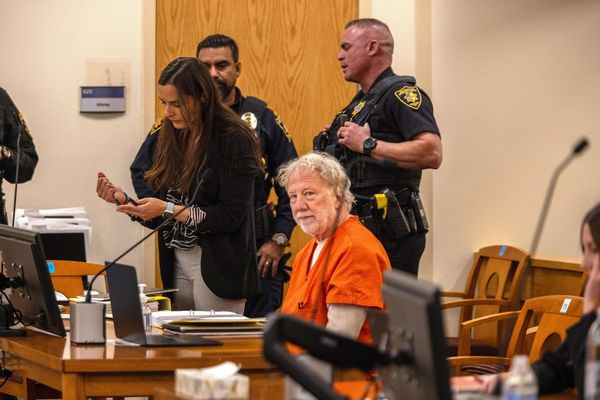
One morning earlier this month, Melanie woke up to the news that Immigration and Customs Enforcement (Ice) had detained more than 40 migrant workers at a garment factory, as part of a series of raids across Los Angeles. Her high school, located downtown, is not too far away from where the arrests took place. She didn’t want to go to school – but still drove there to complete her final exams.
“When I got to school, that fear didn’t leave me. I might have been in a safe enough place but my family wasn’t,” said Melanie, whose uncle and father work in the Fashion District, the neighborhood where the raid took place. She did not give her last name to protect her family’s safety, since many members are undocumented. “Overall, every second was daunting. It felt like time wouldn’t move fast enough.”
That fear still hasn’t left. After her sister’s graduation the following week, she and her family decided to go straight home instead of going to eat together at a restaurant.
“We knew it wouldn’t be safe or smart to go out. Even though we usually do, whenever we have a special achievement in our lives we celebrate, this time we couldn’t due to fear of being deported. We came straight home through the least common streets seeing as Ice has been by my school multiple times.”
This is a feeling that Angélica, her social studies teacher who grew up undocumented and did not give her last name, knows all too well. She makes sure to keep track of Ice activity in the area and let Melanie and other affected students know. Because of own personal experiences, she is passionate about helping other undocumented youth navigate scholarships, internships, or jobs, and learn how to advocate for themselves safely.
“What people don’t know is the copious amount of trauma living in a mixed-status family,” she said. “There’s a heavy presence of it everywhere. The fear will come up at random times. It’s something students are always thinking about.”
Across LA and the rest of the US, undocumented students and those with mixed-status families have been living in heightened fear amid the Ice raids over the last two weeks. Families are choosing to stay inside, skipping graduation ceremonies and foregoing grocery shopping. The raids sparked a series of protests against the deportations, which the Trump administration responded to by sending the national guard and marines to downtown LA.
Experts say that these events could have serious negative impacts on mental health for children growing up, and also create long-term disparities in food security, academic performance and school attendance.
“These raids are going to be core memories and they will shape how a whole generation of children of undocumented immigrants understand legal vulnerability,” said Dr Laura Enriquez, an associate professor of Chicano/Latino studies at the University of California Irvine who has researched the long-term impacts of immigration policy on mixed-status families.
Embedded in their local communities, teachers are now becoming the biggest advocates and resource distributors for their students, helping them develop longer term resiliency at school and beyond.
Martha Meléndrez has been working as a psychiatric social worker (PSW) at a school near MacArthur Park in LA for the past four years. She services first-generation, English language development (ELD) newcomer students and a predominantly Latino community. Her community has faced Ice raids before: three months ago, a student at her school, who was a US citizen, had his mother taken away. She provided him with weekly check-ins and psychological counseling and information on legal support services to help the mother get court visits. At school, she also facilitated a series of community circles in her ELD classes, allowing students to discuss ongoing events and how it has affected them.
“Providing a space for students to process is absolutely critical right now,” she said. Many of her students are recent arrivals to the US who are applying for asylum and adapting to a new environment. “They were able to find common ground and connection with other students about their fears, their hopes and their feelings.”
As a former undocumented person and newcomer, Meléndrez channels her own perspective to inform her practice and outreach. “I am part of this community. This provides me with a unique lens of what students and families are going through,” she said.
That the new round of Ice raids happened so close to the end of the school year makes her worried about how students will be supported in the coming months.
“Right now, a lot of educators and PSWs, we are not able to provide that care for our school community because of summer. Unfortunately, they may not have access to a trusted adult and resources like during the academic year,” Meléndrez said, adding that the most common trauma responses for students right now may be excessive worry and nightmares about family separation.
Throughout the Los Angeles United School District, which serves almost 400,000 students across more than 1,300 schools, there are 770 funded PSWs who provide mental health care and counseling onsite. However, not all schools can afford to have a PSW full-time or onsite; 95% are full-time in the second largest school district in the nation, according to an LAUSD spokesperson. The district also funds 171 student and family resource navigators, who provide referral and case management services within school-based health clinics.
“At this time, we are actively monitoring the mental health and wellness impact within the community related to recent activity and will develop appropriate strategies as needed,” said the LAUSD spokesperson, when asked if the district would be adding any PSW services.
For now, Meléndrez has encouraged students and teachers to share and use the district’s mental health family hotline, which the superintendent said at a press conference last week will be active 24/7 in the summer too.
But students who normally rely on free lunches at school during the summer may be at a disadvantage, said Angélica, noting that at her school, about one out of every three students relied on a free breakfast and lunch program. Because of the fear of going outside with the Ice raids, she anticipates that more students will go hungry.
In 2020, she volunteered to deliver dozens of boxes of food to students and families during the Covid-19 pandemic. Now, she recommends that LAUSD bring back the same food distribution efforts so that students and their families don’t have to leave the house to get food.
“A lot of people are in lockdown right now and it’s terrifying,” Angélica said.
A district spokesperson said that breakfast and lunch will be served at 582 schools Monday through Friday during summer school and afterschool programming through 26 July. More than 90,000 are enrolled in the summer school session so far. Starting later this month, the district has asked the Los Angeles regional food bank to supplement these meals with produce bags at different school sites that can be taken home and shared with the whole family.
Melanie, the student, has said that her family now relies on her cousin, who is a US citizen, to go out and purchase necessities like food and personal hygiene products they need.
Alejandra, a fifth-year English language development teacher in South Central Los Angeles, said that building a relationship with her students is key to addressing what’s going on.
“[My students] have had a range of emotions. They miss their home country. I see my job as not necessarily talking to them, but to make space for them to talk to each other,” she said. Teachers typically do not ask about students’ documentation status, but developing that rapport allows students to open up in times of crisis.
“Having trusting relationships and identifying those resources helps a lot,” Alejandra said.
Creating a collective healing practice can positively impact undocumented children, who may feel high levels of uncertainty and isolation. Research shows that reframing their experiences as a strength can help build resilience.
“There is a reason that ‘you are not alone’ messaging is powerful in the immigrant justice movement,” said Dr Dana Rusch, an associate professor of clinical psychiatry at the University of Illinois Chicago. “Social support and the sense of belonging we cultivate is a universal salve for suffering.”
Despite the school year ending, teachers are continuing to organize to provide care for their students. Monica Caballero, a special education teacher at a middle school in Harbor City in the southern part of LA, volunteers to help coordinate one of the United Teachers of Los Angeles union rapid response networks where she helps respond to credible sightings of Ice and other federal agents in her local neighborhood community patrols.
“Everyone is inundated with tips and leads and we are all trying to do our best to verify and respond when needed,” Caballero said. Even though there’s sometimes confusion with a false identification, “the reality is if we go out and there’s no activity, that is a best case scenario,” she said.
On Instagram, organizations such as Union del Barrio, Self Defense Coalition LA, and other neighborhood patrol accounts have posted about Ice sightings in an effort to warn community members to stay indoors. Families have also relied upon a site called People over Papers, where users can submit photos and videos of suspected Ice activity and volunteers verify the sightings through a tedious process that involves reverse Google image searching and cross-checking with news reports and rapid response networks.
In January, the Trump administration announced that schools and churches would no longer serve as sanctuary sites and that immigration authorities can enter to conduct arrests, rescinding “protected area” guidance from the previous Biden administration that had focused on children and social service establishments.
In response, volunteers had to cross out “churches and schools” as safe place options on their materials. Caballero has passed out these updated information leaflets and hosted Know Your Rights trainings online.
“I’m Mexican American, my grandparents immigrated in the 1960s. I am fortunate enough to be documented and that’s not the case for a lot of our community,” she said. “It is the responsibility of those of us with documented status to protect the most vulnerable in our communities.”







